- Home
- Andrew Kaufman
Born Weird Page 16
Born Weird Read online
Page 16
“But we did,” Richard said. “We found you. You found us!”
“Wait,” Angie asked. She took a step backwards. “What do you mean?”
“Don’t any of you know what day this is?” Besnard asked.
“I’m not exactly sure what year this is …”
“January 22?” he asked. Exasperation returned to his voice. His children shrugged their shoulders. “It’s my fucking birthday! I turn fifty-three today.”
“Don’t say it, Dad,” Angie said. “Please please don’t say it.”
“Don’t say what?” Lucy asked.
“Angie, listen to me,” her father continued, “what I’m about to say is very serious.”
“Please? Don’t say it.”
“What don’t you want him to say?”
“It’s not the year. It’s that I’m in the terminal stages of pancreatic cancer. My pain is constant.”
“Don’t you want to live to be at least a hundred?”
“I’ve fought it long enough. I was born at 7:17 p.m. on January 22. I will die at 7:17 p.m. on January 22. Not a second later or a moment earlier …”
“Who doesn’t love a countdown?”
“Angie!”
“… a little over three hours from now. I can only believe that this is no coincidence. That something divine and uncanny has brought you here, at this moment.”
“Until you realize coincidence doesn’t exist …”
“Stop it, Angie!”
“Shut up!”
“The biggest mistake of my life was abandoning you all. It felt right at the time. At least it felt like a solution. Then it didn’t, but there was no going back.”
“Please don’t ask, Dad. Please don’t ask.”
“In three hours and twenty-odd minutes I’ll be dead. I would like nothing more, my final request, what would allow me to go with peace and dignity, is for all of you to forgive me.”
Besnard began to cough. The coughing turned into a fit. He took a plastic bottle from his pocket. He twisted it open. As he poured yellow pills in his open palm he coughed again. The pills flew into the air. Angie was out the door before they landed.
IN SOCK FEET ANGIE’S options were few. The storm remained strong and the parking lot was buried. But the roof of the motel had an overhang, which had created a small snowless trench against the side of the building. She ran along this because there was nowhere else to go.
Angie ran the length of the motel. Then she ran alongside of it. Her feet were already cold. When she got to the back she saw her father’s 1947 maroon Maserati half-buried in the snow.
The car was parked with the driver’s side against the back wall of the motel. The front end faced her. It was still buckled. The basketball-sized hole remained in the front windshield. A flattened cardboard box had been duct-taped over the passenger window. Angie easily removed this and then, headfirst, she crawled inside.
The sound of the wind disappeared but snow blew through the open window. She moved over and sat behind the wheel. She watched her breath. A pile of snow grew on the passenger seat. She had no idea how much time passed and then Richard arrived. He put his head through the passenger window. She didn’t look over.
“Amazing. He must have had it towed,” Richard said. “Can I come in?”
“It’s your funeral.”
“Funny.”
Richard pushed in several blankets and then he climbed, feet first, into the car. Angie put her hands on the wheel. She continued to look through the hole in the windshield.
“Here,” Richard said. He held up one of the blankets. “Freezing to death will not help you make your point.”
Her teeth were chattering. She took it from him. Richard put several more on top of her.
“How much time is left?” Angie asked.
“You’ve been out here about an hour.”
“And I suppose you’ve all forgiven him already?”
“Before we’d even noticed you were gone. Sorry.”
“Do you think he’s really going to do it?”
“He’s not well,” Richard said. His voice had cracked. “Yes. I believe he’ll pull it off.”
“I don’t think I can do it.”
“It’s true, you’re in a hard place,” Richard said. He extended his index finger and he wiped a line of snow from the dashboard. “Angie, I’ve spent my whole life trapped in the future. I can tell you that it’s just as dangerous as being trapped in the past.”
“And?”
“It won’t hurt you to forget what he did. Or at least if it does, you’ll heal. Sometimes it’s important to let yourself get hurt. And right now, the present tense is that our father is in there and he’s sick and weak and dying. That’s all you need to remember.”
Angie nodded her head. She didn’t look over. Richard sat there for several moments and then he wrapped a blanket around her feet and crawled back out the window. Angie sat in the car. She lost track of time. She continued staring through the hole in the windshield, even when Abba crawled through the passenger window.
“Hey,” she said.
“Hello.”
“I’ll go right now if you drink this,” Abba said. Angie looked over and saw that Abba held out a Thermos. It was the old-fashioned kind, plaid and metal. Abba unscrewed the top and poured what appeared to be chicken soup into the upturned lid. She held it out. Angie took her hands out from under the blankets and held it. She kept her hands wrapped around the upturned lid because the heat felt so good.
“Can I just say one thing before I go?”
“Will you say it anyway even if I say no?”
“Yes.”
“Go ahead.”
“The thing about hope, it’s clear to me now, is that it isn’t noble or saintly. It’s something you do for yourself. That’s why it’s so easy to get trapped in it,” she said.
“So?”
“Maybe forgiveness works the same way? Maybe it’s easier to do than you think,” Abba said. She reached out her hands and put them on Angie’s and then she raised the mug to her sister’s mouth. Angie drank a bit of the soup. After the first sip she started drinking it on her own.
“Our father has been a ghost for most of our lives,” Abba continued. “This is your last chance to get rid of him. Don’t let your anger at him stop you from doing something for yourself.”
Angie drank the last of the soup. Abba refilled the mug. She put the lid on the Thermos, which she left on the seat as she crawled out the window.
“How much time is left?” Angie asked.
“A little over an hour,” Abba said. She crouched down and looked through the passenger window. “Are you sure you want to stay out here? Your lips are a little blue. You could just as easily not forgive him inside, where it’s warm.”
Angie shook her head. She listened to Abba’s footsteps. She wondered who’d be next. The snow had built up on the dashboard when Kent climbed inside the car. He sat down and then he reached underneath him and pulled the Thermos between his legs.
“Can I have some of this?” he asked.
“Go ahead,” Angie said. Kent unscrewed the top. He drank straight from the Thermos. Angie held out her mug and he filled it.
“So what’s your argument?”
“Strength!”
“Is there more?”
“Physical strength is bullshit. Emotional strength is gold. Don’t be weak—forgive him!”
“Kent, that’s the lamest one yet.”
“Well, ya, but this really isn’t my thing. And Lucy’s coming up, so you know, you still got that. Can I tell you something though?”
“Of course.”
“You wanna know what the Shark said to me?”
“Yes.”
“She said, ‘Only the weak are afraid to appear so.’ ”
“I don’t know if that applies.”
“Maybe it does. Maybe it doesn’t. I just wanted to tell you. Can I tell you something else?”
“Sure.”
/> “I love you. I really do,” Kent said. Angie turned and she looked at him. His head was tilted back and he drained the last of the soup from the Thermos.
“I love you too,” Angie said.
“I know,” he said. “He’s really going to do it. You’ve got about twenty-five minutes.”
Then he crawled back out the window. Angie began to wait. She waited for a long time. She waited for what seemed like much more than twenty-five minutes. Then she heard Lucy’s footsteps in the snow. Lucy climbed into the passenger seat. She did not turn to look at Angie. She looked straight ahead and then she started talking.
“No one gets found in love. Everyone gets lost in it. Because love is overwhelming. It’s beyond your control. You have to relinquish control to be in love. And that’s a good thing. There’s a beauty to being lost in something bigger than you.
“The bad part is that you’re now vulnerable to them. They can hurt you in ways that no one else can,” Lucy said. She continued to look at the dashboard but her left hand reached out and took Angie’s. “But here’s the thing. Love is so uncontrollable that sometimes it won’t go away, even when you want it to. Even if someone’s hurt you really badly, you may still love them. That’s what forgiveness is. It’s admitting that even though they’ve done this horrible, horrible, thing, you still love them. If you cannot forgive someone, you’re telling them you have no love for them. So ask yourself, quickly, is there any love for him inside you? If there is, then not forgiving him will be a lie. One you will never, ever, be able to take back.”
Lucy let go of Angie’s hand. She didn’t wait for her sister to respond. She crawled out of the car and Angie sat there, alone.
MORE SNOW CAME THROUGH the window. The pile on the passenger seat grew. Angie’s breath remained visible. She looked through the basketball-sized hole in the windshield. She waited for an epiphany but all she felt were her hands getting colder.
She sat there a while longer. Then she pushed off the blankets and crawled through the passenger window. Her siblings had all used the same set of tracks through the snow. She stepped in these as she walked back to the motel. The bell above the door dinged as she went inside. No one came to greet her. She walked around the counter. Sitting on a kitchen chair she pulled off the three layers of snow-encrusted socks. Her toes were white and wrinkled and it hurt to touch them.
“Angie?” Richard called.
“I’m here,” Angie said. She stood up. Her feet had gone pins and needles.
“Come on!” Abba called.
“Hurry up,” Lucy said.
“Four minutes. Four fucking minutes.”
“Okay! Okay!” Angie said. She limped towards their voices. Outside his bedroom door she readied herself for the strange things she expected to see. But when she went inside the lights did not dim, nor did the furniture jump around. All she saw was a sick, frail man lying in bed, surrounded by his children. Each of them touched her as she moved past and sat on the edge of his bed.
“I’m scared,” he said. He raised his hands and she took them.
“Don’t be.”
“You don’t have to do this. It’s a lot to ask.”
“But I can. I do. I really do, Dad,” Angie said. She looked up at her siblings, then back down at her father. She looked into his eyes. She had expected just to voice the words. But at this moment it became clear to her that the only thing powerful enough to transform people into brothers and sisters, mothers and fathers, is the ability to forgive each other. That what really gets handed down from generation to generation isn’t blood or history, but the will to forgive.
“I forgive you,” Angie said. Besnard Weird nodded his head. Then his eyes stayed open.
ANGIE HEARD THE SNOWPLOW before she saw it. She was sitting on a wooden chair at her father’s kitchen table. The chair wasn’t comfortable. She hadn’t moved from it in several hours. She was the only Weird awake. The rumble got louder. She stood up as the snowplow went past. It shook the windows. A dip in the road made it look like it had gone over the cliff. Angie turned around and saw that her siblings were standing behind her. They had seen it too.
“I know what we should do,” Angie said.
“I agree,” Lucy said.
“Is it legal?” Abba asked
“Who cares if it’s legal?” Richard said.
“I can’t think of anything he’d want more,” Kent said.
“Neither can I.”
“For him or us.”
“Exactly.”
Wearing layers of their father’s winter clothes, they went outside. There were only two shovels so they worked in shifts. They dug right down to the frozen ground. They cleared a path from the back of the motel, across the parking lot, over the road, to the edge of the cliff. When they were finished they were exhausted and hungry. They didn’t rest and they didn’t eat. They went back inside the motel and into his bedroom.
“Should we dress him?” Lucy asked.
“He already is dressed.”
“No, but, like in a suit?”
“Does he have one?”
“Can you ever remember him wearing a suit?”
“That’s the only thing I can remember him wearing.”
“Let’s just leave him like this,” Angie said. “Let’s remember him like this.”
Kent did not ask to take a vote. He took his father’s right foot. Abba got hold of the left. Richard and Lucy held the shoulders. Angie ran ahead. Moving chairs and plant stands, she cleared a path. They lifted their father from the bed and they carried him through the living room, around the counter and out of the motel. Their boots slipped in the snow. Their arms got tired. They carried him all the way to the crumpled Maserati.
It was easy for Kent to get through the passenger window. The opposite was true for their father’s body.
“I have never known him not to want to get into this car,” Abba said.
“I think we’re going to have to use a bit of force,” Richard said.
They used a bit of force. They got him through the passenger window and behind the wheel. Kent fastened the seat belt. He put the gearshift into neutral, he crawled out, and they all began to push.
It was easier once they got started. When they cleared the back wall of the motel Richard opened the driver’s side door. He turned the steering wheel and they navigated the corner. They gained momentum through the parking lot. They glided across the road. But on the other side there was a slight incline, which stole their momentum.
“Harder,” Angie called.
They pushed harder. Richard and Kent turned around and put their backs against the trunk. Their boots slipped in the snow. They kept pushing and the car crested the incline. Then it began to move on its own. The Weird siblings ran alongside of it. They kept a hand on it. At the edge of the cliff they stopped. The Maserati kept going.
The Weird siblings watched it fall. It fell with impossible slowness. Then it hit the frozen surface of the water. The crumpled front end cracked through the ice. The car bobbled three times. It fell flat. And then it floated.
“No way,” Lucy said.
“No fucking way,” Kent said.
“Right to the end,” Abba said.
“I did not see this coming,” Richard said.
“Just wait,” Angie said.
They all held their breaths. The car slowly began to sink. When it was completely submerged, they all breathed out. Sixteen hours after they sent the Maserati over the cliffs of Shell Cove, two years, nine months and two days after the death of the Shark, and thirteen years after Kent scored his first and only touchdown, they stood in front of the departures board at the Halifax Stanfield International Airport. The rental car had been returned. The information on the board hadn’t changed for several minutes. Yet they continued to stare at it.
The board announced many flights. One to Vancouver departed in ninety minutes. Another left for Montreal in two hours. There was a direct flight to Toronto, where there’d be flights to Up
liffta. But no tickets had been purchased. All five of them stood there. They stared at the board. Then the destinations shuffled downwards. A new flight appeared at the top. It announced flight AC468, to Winnipeg, Manitoba, which left in three hours.
All of them saw it. And all of them gasped. They shuffled closer together. They took each other’s hands. They looked down from the board and then at each other.
“The winter there isn’t nearly as bad as they say,” Lucy said.
“I have nothing waiting for me in Montreal,” Richard said.
“Upliffta has no queen,” Abba said.
“I can tell Paul and Paulette to meet us there,” Angie said.
“I can’t go back to Palmerston Boulevard,” Kent said.
They said nothing more. Single file, they walked to the ticket counter. As they stood in line Angie imagined buying a big house in a residential neighbourhood. The street would be tree-lined. The house would be old. It would occupy a corner lot. They’d move their mother in with them. They’d take care of her together. They wouldn’t let her cut their hair. When she and Paul had a second kid, they’d buy the house beside it. And then as her brothers and sisters became mothers and fathers, and uncles and aunts, they would buy more houses on the street. They’d own every one, on both sides, at the end of their block. Their children would spill out onto the sidewalks, riding bicycles and accidentally breaking windows. A new generation of Weirds, loving each other and being loved. Weirdly being Weird and weirdly doing well.
This is exactly what happened.
ACKNOWLEDGEMENTS
The author wishes to acknowledge that Born Weird would not and could not have been written without …
Rolly Kaufman, Shirley Kaufman and Liz Kaufman—who are nothing like the Weirds.
Barry Miazga and Karen Miazga—who are also nothing like the Weirds.
Phoenix and Frida.
The brilliant insight and editorial compassion of Pamela Murray. RIP Veronica.
The foolhardy belief of Sam Hiyate.
The inexplicable affection of Scott Pack.
The incalculable contributions of Zach Picard, Ian Cauthery, Stephanie Domet, Angelika Glover and Stacey Cameron.

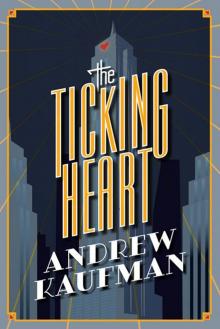 The Ticking Heart
The Ticking Heart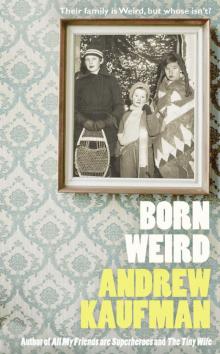 Born Weird
Born Weird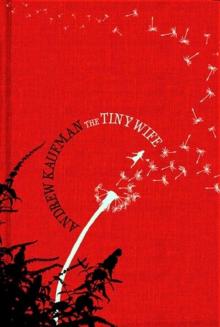 The Tiny Wife
The Tiny Wife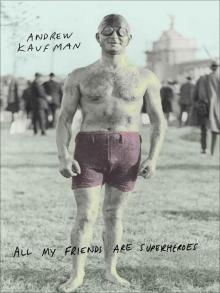 All My Friends Are Superheroes
All My Friends Are Superheroes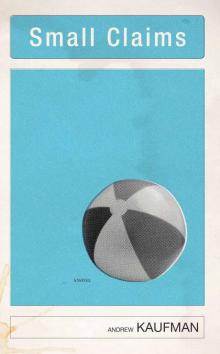 Small Claims
Small Claims The Waterproof Bible
The Waterproof Bible